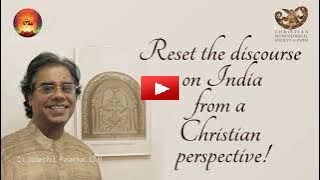
AP 330 to 321
"New Leaders Stir Hopes for Sanskrit in India"
A Christian perspective on India
A Christian perspective on India
| Call Number | AP 327A |
| Part Number | Part I - Syro Malabar Church |
| Title | "New Leaders Stir Hopes for Sanskrit in India" A Christian perspective on India |
| Duration | 3m:30s |
| Place of Recording | Denha Lecture at DVK Bangaluru |
| Date of Recording | 2014 |
| Youtube URL | https://www.youtube.com/watch?v=l0Pd0zFiyXE |
| Video Segment (s) |
|
THE SYRIAC HERITAGE OF THE SYRO MALABAR CHURCH: AN ESSENTIAL COMPONENT OF THE CULTURAL FABRIC OF INDIA. DENHA ENDOWMENT LECTURE, DHARMARAM VIDYA KSHETRAM, BENGALURU, INDIA. 19 JULY, 2014.
Joseph J. Palackal
Abstract: The Syriac heritage of the Syro Malabar Church is an integral part of the cultural treasures of India and the world. The Syro Malabar Church (about 4 million members) is the largest among the eight churches of the St. Thomas Christians, who were evangelized by the missionary endeavors of the Aramaic-speaking Apostle Thomas. From early on, the Aramaic (Syriac) language and music played a significant role in the experience of the Christian faith in India. In spite of the challenges from Portuguese missionaries in the sixteenth century, the Syro Malabar Christians zealously cherished and preserved the Syriac tradition. In the following centuries, they also adapted many liturgical practices from the Roman rite by translating the respective Latin texts into Syriac, and composing them anew in Kerala, thereby adding another layer to the already vast Syriac chant repertory. With the vernacularization of the liturgy in the 1960s, however, intimacy with the Syriac tradition declined gradually. Luckily, the generation that was born during the transitional period continues to hold, albeit advancing in years, a prolific memory base of melodies and experiences associated with the Syriac tradition. With a focus on the musical and liturgical elements, this article provides an overview of the various aspects of the Syriac heritage, practical suggestions to preserve it for posterity, and recommendations to include it in our conversations on the cultural legacy of India.
Introduction
On Wednesday, June 16, 2014, The New York Times carried the following news item by its staff reporter, Ellen Barry, on the first page of the International section: “New Leaders Stir Hopes for Sanskrit in India.” The team of administrators, under the leadership of the new Prime Minister Narendra Modi, was making plans to promote the study of the Sanskrit language. “In late May,” the article said, “there had been rumors that he [the Prime Minister] would go a step further and take his oath of office in Sanskrit.” Amid a hectic election campaign, Mr. Narendra Modi’s team spent time deliberating on how to draw attention to the Sanskrit language as a means to reclaim a particular aspect of the history of India and its cultural legacy. Even though the new Prime Minister changed his mind at the last minute and took his oath in Hindi, the very idea of doing it in Sanskrit was a bold and calculated move. Today, we may engage in a similar pursuit. We may deliberate on the unique religious and cultural heritage of the Syro Malabar Christians. One of the determining factors of Kerala's Christian heritage belongs to the Aramaic language in which Jesus and his disciples preached the gospel. In other words, the St. Thomas Christians in India claim to have received the good news well before the original teachings of Jesus were translated into the medium of the Greek language, and were bequeathed to the world by the four Gospel writers. We can also be uniquely proud of the fact that the Christian faith came to India, where the Aramaic language was already in use for several centuries; Aramaic was one of the languages in which Emperor Ashoka (ca. 269-232 BC) promulgated his edicts (see Mukherjee, 1984). Therefore, it is worthwhile to reset the discourse on India from a Syriac perspective.
Keywords : #Syriac #syromalabarchurch #narendramodi #SyriacHeritage #indianchurch #IndiaandChristianity #syromalabarchurch #josephpalackal #aramaicproject #pmindia #primeminister #primeministerofindia #narendramodi #narendraModiIndia #Sanskrit
User comments
when we promote specific language, we should be aware of the complex language evolution in kerala. We shouldnt be simply promoting sanskrit or aramic . We can promote in specific context but not by downgrading or neglecting the old malayalam.
We should be aware of malayalam langauge history and evolution. Malayalam sprouts from dravidian language family which is not related to Sanskrit( indo european language) and Syriac (semitic language) but Malayalam absorbed many of the by sanskrit and syriac . i used the term "absorbed" because Malayalam absorbed or incorporated many words from sanskrit. That doesnt mean Malayalam orginated from sanskrit. Malayalam originates from from chen thamizh. until 8 th cetnury, we didnt had this kind of influnece by sanskrit in malayalam which was introduced to kerala by bhramin migration and this process malayalam got sanskritized by this it "downgraded" many of the Old malayalam words and many mlayalalam word diapperead or replaced by sanskrit. Over the generation, old malayalam words got removed from the malayalalm literature land scape. After manipravlam period, Literature become equivalent to sankrit literature.
So in the context of syro malabar liturgy, i have something to propose.
From Liturgy language prespective, Aramic/Syriac is the mother of syro malabar liturgy, the true source of syro malabar liturgy. At the same time, when we translate to malayalam it shouldn't be a full sanskrit translation it should be also transalation of malayalam of dravidian orgin. Too much sankritization of syro malabar liturgy is giving wrong impression that malayalam is sanskrit. No, Malayalam and sanskrit are 2 different language and malayalam have absorbed many sankrit . Like now malayalam is absorbing many english words. We should be protecting the old malayalam words in Qurbana. For eg: thirunal, perunal , uyirppu, these are old malayalam words which is still retained in our way of life practicing nazrani margam.
Also it should be kept in mind that Malayalam evolved in Thamizhakam which included both keralam and thamil nadu both are newly created identities. Thamizkam already had great sangam literature tradition in that cultural context only Nazrani tradition orginated and evolved.
- Ouseph Mathai, April 2023


